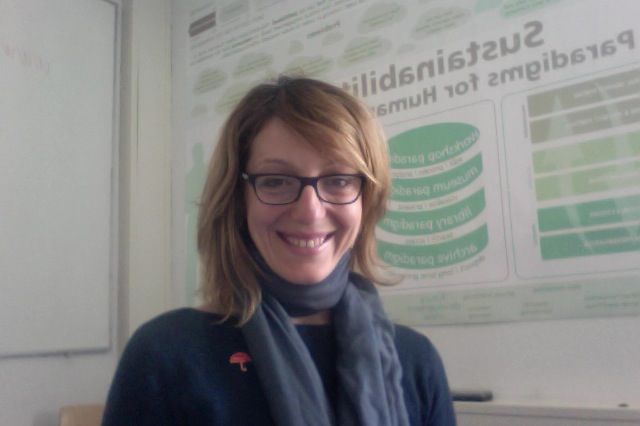Studying at the University of Verona
Here you can find information on the organisational aspects of the Programme, lecture timetables, learning activities and useful contact details for your time at the University, from enrolment to graduation.
Academic calendar
The academic calendar shows the deadlines and scheduled events that are relevant to students, teaching and technical-administrative staff of the University. Public holidays and University closures are also indicated. The academic year normally begins on 1 October each year and ends on 30 September of the following year.
Course calendar
The Academic Calendar sets out the degree programme lecture and exam timetables, as well as the relevant university closure dates..
| Period | From | To |
|---|---|---|
| I semestre | Oct 1, 2018 | Jan 12, 2019 |
| II semestre | Feb 18, 2019 | Jun 1, 2019 |
| Session | From | To |
|---|---|---|
| ESAMI LINGUE- sessione invernale | Jan 14, 2019 | Feb 16, 2019 |
| ESAMI LINGUE- sessione estiva | Jun 3, 2019 | Jul 27, 2019 |
| ESAMI LINGUE- sessione autunnale | Aug 26, 2019 | Sep 21, 2019 |
| Session | From | To |
|---|---|---|
| LAUREE LINGUE - sessione autunnale (a.a. 2017/18) | Nov 12, 2018 | Nov 17, 2018 |
| LAUREE LINGUE - sessione straordinaria (a.a. 2017/18) | Apr 1, 2019 | Apr 6, 2019 |
| LAUREE LINGUE - sessione estiva (a.a. 2018/19) | Jul 8, 2019 | Jul 13, 2019 |
| LAUREE LINGUE - sessione autunnale (a.a. 2018/19) | Nov 4, 2019 | Nov 9, 2019 |
| LAUREE LINGUE - sessione straordinaria (a.a. 2018/19) | Mar 30, 2020 | Apr 4, 2020 |
| Period | From | To |
|---|---|---|
| Festa di Ognissanti | Nov 1, 2018 | Nov 1, 2018 |
| Sospensione dell'attività didattica | Nov 2, 2018 | Nov 3, 2018 |
| Festa dell’Immacolata | Dec 8, 2018 | Dec 8, 2018 |
| VACANZE DI NATALE | Dec 22, 2018 | Jan 6, 2019 |
| VACANZE DI PASQUA | Apr 19, 2019 | Apr 23, 2019 |
| Sospensione dell'attività didattica | Apr 24, 2019 | Apr 24, 2019 |
| Festa della liberazione | Apr 25, 2019 | Apr 25, 2019 |
| Festa del lavoro | May 1, 2019 | May 1, 2019 |
| Sospensione dell'attività didattica | May 20, 2019 | May 20, 2019 |
| Festa del Santo Patrono | May 21, 2019 | May 21, 2019 |
| Festa della Repubblica | Jun 2, 2019 | Jun 2, 2019 |
| VACANZE ESTIVE | Aug 13, 2019 | Aug 18, 2019 |
Exam calendar
Exam dates and rounds are managed by the relevant Foreign Languages and Literatures Teaching and Student Services Unit.
To view all the exam sessions available, please use the Exam dashboard on ESSE3.
If you forgot your login details or have problems logging in, please contact the relevant IT HelpDesk, or check the login details recovery web page.
Academic staff
 alessandro.bigardi@univr.it
alessandro.bigardi@univr.it

Bradas Marija
 marija.bradas@univr.it
marija.bradas@univr.it
 paolamaria.caleffi@univr.it
paolamaria.caleffi@univr.it
 veronica.gobbato@univr.it
veronica.gobbato@univr.it
 tiziana.mancinelli@univr.it
tiziana.mancinelli@univr.it
 silvia.zollo@univr.it
silvia.zollo@univr.it
Study Plan
The Study Plan includes all modules, teaching and learning activities that each student will need to undertake during their time at the University.
Please select your Study Plan based on your enrollment year.
1° Year
| Modules | Credits | TAF | SSD |
|---|
2° Year activated in the A.Y. 2019/2020
| Modules | Credits | TAF | SSD |
|---|
3° Year activated in the A.Y. 2020/2021
| Modules | Credits | TAF | SSD |
|---|
| Modules | Credits | TAF | SSD |
|---|
| Modules | Credits | TAF | SSD |
|---|
| Modules | Credits | TAF | SSD |
|---|
| Modules | Credits | TAF | SSD |
|---|
Legend | Type of training activity (TTA)
TAF (Type of Educational Activity) All courses and activities are classified into different types of educational activities, indicated by a letter.
English literature 2 (2019/2020)
Teaching code
4S002927
Teacher
Coordinator
Credits
9
Language
English
Scientific Disciplinary Sector (SSD)
L-LIN/10 - ENGLISH LITERATURE
Period
I semestre (Lingue e letterature straniere) dal Sep 30, 2019 al Jan 11, 2020.
Learning outcomes
The course is taught in English and aims at providing students with an introduction to British literature between the Restoration period to the Romantic age, with a focus on a number of selected texts. The course also aims at providing a basic knowledge of the main critical approaches and of the main features of literary genres.The main aim of the course is that of providing students with a good level of knowledge of the period of literary history in object (in terms of historical context, texts, genres, movements, authors) and to develop their critical skills, in terms of ability to read critically, to discuss literary topics in English, to place literary texts in a specific historical-cultural context. At the end of the course students will be able to:- read critically the set texts and place them in their respective historical-cultural contexts- discuss literary topics in a structured and informed way - discuss literary topics in English in a clear and consistent way
Program
A) Primary Texts (any edition, but NOT abridged)
- H. Walpole, The Castle of Otranto
- M.G. Lewis, The Monk
- M. Shelley, Frankenstein
B) Critical Texts (compulsory)
- Fred Botting, The Gothic (London and New York: Routledge, 2005), capitoli 1-5
- Catherine Spooner, Emma McEvoy, The Routledge Companion to Gothic (London and New York: Routledge, 2007), capitoli 19-22
C) History of Literature (compulsory)
- A. Sanders, The Short Oxford History of English Literature, Oxford University Press, 2003
NB: the programme will be integrated at the beginning of the course
| Author | Title | Publishing house | Year | ISBN | Notes |
|---|---|---|---|---|---|
| Mary Shelley | Frankenstein, or The Modern Prometheus | 1818 | |||
| Horace Walpole | The Castle of Otranto | 1764 | |||
| Fred Botting | The Gothic (London and New York: Routledge, 2005), capitoli 1-5 | 2005 | |||
| Matthew Gregory Lewis | The Monk | 1796 | |||
| Catherine Spooner, Emma McEvoy | The Routledge Companion to Gothic (London and New York: Routledge, 2007), capitoli 19-22 | 2007 | |||
| Andrew Sanders | The Short Oxford History of English Literature | Oxford, Oxford University Press | 1994 |
Examination Methods
The lessons will be in English. The exam will be an oral discussion in English on the topic of the course and the texts in the program (parts A,B,C).
In particular:
- the ability to discuss topics (literary trends, authors, genres) within the history of English literature
- the ability to present a critical argumentation on topics related to the texts of the syllabus (making examples from scenes and passages)
- the ability to make connections between the topics of the course, on the basis of the critical texts indicated in the programme
Requirements
Students unable to attend lectures are required to get in touch before preparing for the exam. The programme and the modalities of assessment do not vary for Erasmus students
All students, possibly also the students who will not be able to attend the course regularly, are kindly invited to attend the first class of the course, when the programme will be illustrated in detail.
Type D and Type F activities
To discover all the teaching activities accredited by the foreign teaching college click here
Career prospects
Module/Programme news
News for students
There you will find information, resources and services useful during your time at the University (Student’s exam record, your study plan on ESSE3, Distance Learning courses, university email account, office forms, administrative procedures, etc.). You can log into MyUnivr with your GIA login details: only in this way will you be able to receive notification of all the notices from your teachers and your secretariat via email and soon also via the Univr app.
Student login and resources
Assegnazione tutore
Attività accreditate D/F
Calendario didattico dettagliato
Cambio lingua curriculare
Competenze informatiche
Competenze linguistiche (prima e seconda lingua)
Competenze linguistiche in triennale (terza lingua CFU F)
Compilazione del piano didattico
Corso di Lingua portoghese
Erasmus+ e altre esperienze all'estero
Linguistic training CLA
Graduation
List of theses and work experience proposals
| Stage | Research area |
|---|---|
| PROGETTO MAMBRINO Stage per bibliografia | Various topics |
Stage e tirocini
Nel piano didattico della laurea triennale in Lingue e culture per l’editoria (L11 ED) è previsto un tirocinio/stage obbligatorio (CFU 6).
Le attività di stage sono finalizzate a far acquisire allo studente una conoscenza diretta in settori di particolare interesse per l’inserimento nel mondo del lavoro e per l’acquisizione di abilità professionali specifiche.
Le attività di stage sono svolte sotto la diretta responsabilità di un singolo docente presso studi professionali, enti della pubblica amministrazione, aziende accreditate dall’Ateneo veronese.
I crediti maturati in seguito ad attività di stage saranno attribuiti secondo quanto disposto nel dettaglio dal “Regolamento d’Ateneo per il riconoscimento dei crediti maturati negli stage universitari” vigente.
- Tutte le informazioni in merito agli stage per futuri studenti sono disponibili alla pagina Stage e tirocini.
- Tutte le informazioni in merito agli stage per studenti iscritti sono pubblicate in MyUnivr - come fare per - stage e tirocini.
- Tutte le informazioni in merito agli stage per le aziende sono disponili alla pagina Stage e tirocini per azienze.
Ulteriori informazioni al seguente link https://www.univr.it/it/i-nostri-servizi/gestione-carriere-studenti-lingue-e-letterature-straniere/stage-e-tirocini-lingue-e-letterature-straniere

 +39 045802 8409
+39 045802 8409






























